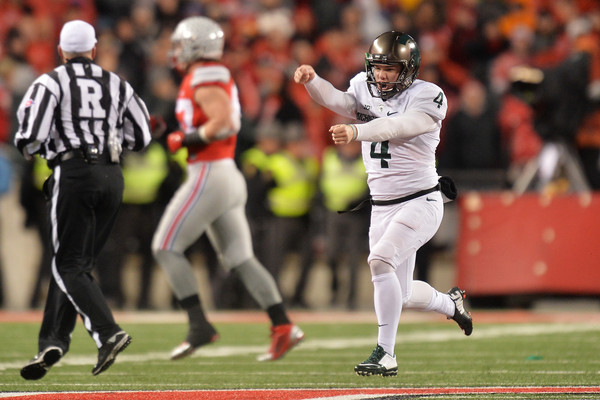Just two short years ago, teams like Alabama, Florida State, Ohio State and Baylor were fighting for a spot in the BCS National Championship.
Now, a host of teams are fighting for a spot in the new four-team playoff system.
It's a different system, but it's still flawed.
The only difference is that back in 2013, it was a group of computers deciding the teams' respective fates, and now it is a group of humans.
Let's use Ohio State and Oklahoma as Exhibit A.
Ohio State has been ranked the top team in the country since the start of the season, and even though they haven't made it look easy or pretty, they won.
Oklahoma, on the other hand, was not in anyone's national championship conversation in the preseason. Then they lost to Texas in the fifth game of the season.
Recently, the Buckeyes and Sooners have been on different trajectories. Sort of.
Oklahoma is arguably the hottest team in the country, while Ohio State just lost to Michigan State in ugly 17-14 fashion.
In the most recent College Football Playoff rankings, the Sooners are ranked third and the Buckeyes seventh. But when you compare each team's one loss, it is clear that who you lose to is not overly important, it's when you lose.
Because the Sooners got their loss out of the way early in the season, they have had time to work their way back into contention. And somehow, it seems that people have forgotten who their loss came to: the Texas Longhorns. That's the same 4-6 Longhorn team whose only chance to make a bowl game is if there are not enough teams that reach the typical six-win plateau, and bowls get to extend invitations to teams with only five wins.

Still, even then, it's no guarantee that the Horns are going to be able to beat either Texas Tech at home or Baylor on the road.
The Buckeyes, however, are a different story entirely. After winning the inaugural CFB Playoff last year, they were ranked first in the opening polls and remained in the top four until the most recent rankings, where they dropped all the way to number seven.
Why? Because they lost to Michigan State on a last-second field goal in a rainy, sloppy game.
The same Michigan State that has won 63 games since 2010 - which is more victories than powerhouses Baylor, Ohio State, Oklahoma and USC in that span. The Spartans were without their starting quarterback, Connor Cook, but with their stellar defense they are always a tough opponent.
Simply put, Michigan State is a better team than Texas. No questions asked, it's not even close.

Oklahoma and Ohio State have each lost one game and won all the rest. The Buckeyes lost to a team who has a legitimate shot to crack the CFB playoff at season's end, while the Sooners lost to a Texas Longhorn squad who on Thursday night all but ensured that they will not play in a bowl game.
Yet somehow, the Sooners are ranked considerably higher.
So as coaches continue to endorse expanding the playoff to include more teams - as TCU's Gary Patterson did earlier this week - that won't change the fact that it's not nearly a perfect system.
The main complaint about the old BCS system was that it was based solely on data spit out by a computer. Now, we have a group of humans who may or may not know what to look for in a quality football team.
Any interested college football fan should watch this intriguing video, where former Colorado quarterback and current Fox Sports analyst Joe Klatt offers his insight on the playoff committee.
Klatt brings up a slew of excellent points, most notably the fact that former coaches Barry Alvarez and Tom Osborne use their standing as the only coaches on the committee to influence the other members' views of the teams.
Whether or not that is the most potent problem with the current system is too hard to determine, but what is clear is that there are still issues.
At least the computers were consistent in that they looked at the teams' overall body of work and did not have the capacity to get caught up in the momentum of the season. All losses should be treated equally. After all, the season is 12 games long - a loss at the beginning of the season should be judged the same as a loss later in the season.
Ultimately, there probably is no perfect system, there are too many parties involved to make everyone happy. But to this point, there have been too many inconsistencies for my liking.
It doesn't make a whole lot of sense why Oklahoma is ranked so much higher than Ohio State considering the massive discrepancy in their one loss.
Would the Buckeyes have been ranked higher in the old BCS system? Who knows, but at least the computers were consistent.









































